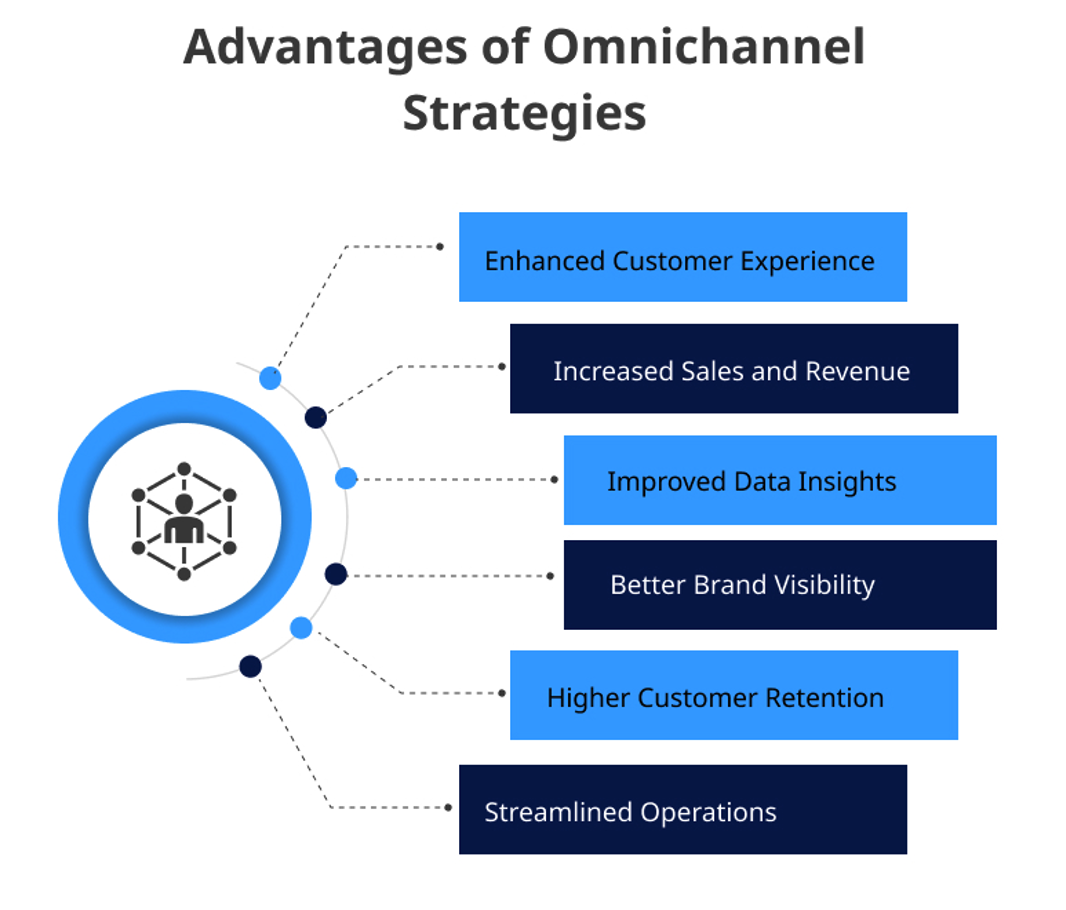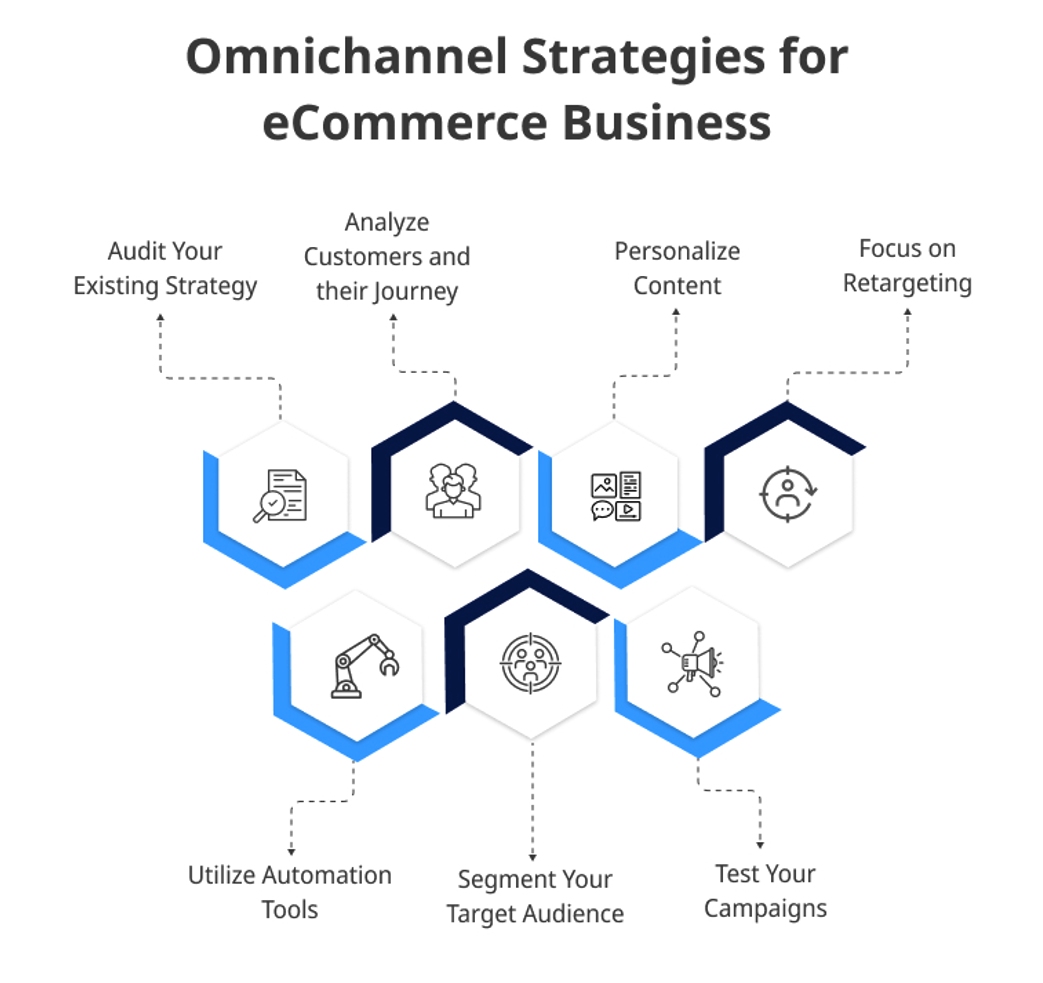
Modern eCommerce necessitates seamless integration across numerous channels and a digital presence to satisfy client expectations. Omnichannel strategies are no longer optional for companies that want to offer a cohesive purchasing experience.
Using an omnichannel strategy guarantees that consumers may easily engage with your brand in-store, on social media, through apps, or on websites. This connection immediately impacts revenue, increasing customer pleasure and loyalty.
In this blog post, we'll examine how ecommerce consulting services can help businesses incorporate omnichannel marketing strategy into business eCommerce models to ensure long-term success.
What are Omnichannel Strategies in eCommerce?
Omnichannel marketing helps eCommerce firms stay consistent across offline and online channels. Brands may offer customized messages to increase conversions by connecting touch points such as websites, apps, email, and SMS.
Consumers interact with companies in various ways. While some may browse in-store and choose home delivery, others may place online orders they pick up in-store. This strategy guarantees a smooth experience regardless of how clients engage with the company.
A well-executed omnichannel strategy integrates all channels, creating a unified customer journey that boosts revenue and fosters a meaningful, customized experience.
Benefits of Omnichannel Strategies for Enterprises
Integrating omnichannel marketing strategies into your eCommerce model offers numerous advantages that can significantly impact your business's growth and efficiency. Below are some key benefits:

- Enhanced Customer Experience: Omnichannel eCommerce integration provides an easy and consistent purchasing experience on all platforms. Customers get a consistent shopping experience whether they use their mobile device, in-store, or the internet, which promotes happiness and loyalty.
- Increased Sales and Revenue: Connecting with customers through various methods can grow your audience and generate additional sales opportunities. Targeted, personalized interactions increase revenue and conversion rates.
- Improved Data Insights: Through omnichannel eCommerce integration, businesses can collect data from several customer touchpoints. This offers thorough insights into consumer behavior, which improves decision-making and allows for the improvement of marketing campaigns.
- Better Brand Visibility: A consistent presence across multiple channels increases brand recognition and visibility. Consumers who frequently interact with a brand—online and offline—are likelier to do so.
- Increased Customer Retention: A seamless, channel-wide shopping experience encourages repeat business. Customers are more likely to return when they connect with your brand easily and feel appreciated.
- Streamlined Operations: Omnichannel strategies maximize business operations by coordinating marketing, customer support, and inventories across all platforms. They reduce redundancies and boost productivity by fostering a more streamlined and effective process.
Top Omnichannel Strategies for your eCommerce Business
Implementing the right omnichannel strategies can transform how you engage with your customers and boost your business performance. Here are eight essential omnichannel retail strategies to consider:

1. Audit Your Existing Strategy
Your first priority should be thoroughly analyzing the current marketing strategy. You must complete the audit even before creating your omnichannel marketing strategy. This will assist you in determining what genuinely functions well for your company and what doesn't.
Examining marketing data in greater detail might yield insightful information and improve your planning. Moreover, you can concentrate on and strengthen those areas by recognizing your eCommerce business’s shortcomings. There are numerous methods you can come up with to improve your current marketing plans.
Client feedback on social media or your eCommerce website frequently provides the finest information. It will show you where you are failing and how successfully you have satisfied your clients.
2. Analyze Customers and Their Journey
A thorough understanding of your target audience forms the cornerstone of any multichannel marketing strategy. But remember that knowing your consumers' location, gender, and age is not the only way to understand them. Rather, you need to pay close attention to how the clients make purchases.
Examine how the client communicates with your company. Recognize the various channels they utilize to interact with your brand. Creating a client journey map is also crucial.
In an omnichannel retail strategy, there are various paths your customers can take to the bottom of the conversion funnel. Customers can purchase the goods via social networking pages, your website, or Google. Ensure clients have an excellent purchasing experience regardless of their chosen path.
3. Personalize Content
One of the most important tactics for improving the efficacy of your omnichannel strategy is personalizing content. Customizing it to each customer's unique interests and habits makes information more relevant and engaging across all touchpoints.
For example, when a consumer interacts with your brand via email, social media, or your website and often searches for eco-friendly products, personalized content can include relevant product recommendations, exclusive deals, or educational articles about sustainability.
This focused approach makes clients feel understood and appreciated by your business, strengthening the bond with them and raising the chance of conversion.
4. Focus on Retargeting
Only some consumers will purchase your enterprise eCommerce goods on their first visit. For this reason, retargeting is crucial for keeping consumers aware of your brand. You may simply retarget your audience by using banner ads on websites, social media platforms, and physical banners in busy areas.
It keeps your enterprise eCommerce platform at the forefront of your clients' minds. The likelihood of a conversion increases with the number of times they view your brand commercial. Retargeting will increase your company's overall return on investment and bring in new customers.
5. Utilize Automation Tools
In today's hectic world, it is not feasible to complete tasks by hand. Technological advancements have greatly simplified companies' marketing. You must employ automation technologies to manage part of your omnichannel marketing tasks. Automation tools can help optimize online shopping with your multichannel marketing strategy.
You may quickly and effectively segment your target group with the help of automation marketing solutions.
Moreover, you can schedule your marketing campaigns and customize your messages. It's simple to assess the success of your marketing initiatives and make the required adjustments. This will assist your enterprise eCommerce and save you time and work.
6. Segment Your Target Audience
You may segment your audience by breaking your consumer base into discrete groups according to their demographics, inclinations, and behavior. It enables you to customize your offers and messaging for every section, guaranteeing that your communication is interesting and pertinent.
For example, you can design customized email campaigns for loyal customers and targeted social media advertising for brand-new users to increase the overall efficiency of your marketing initiatives.
7. Test Your Campaigns
Regular testing determines which omnichannel marketing performs best for various client categories and channels. By A/B testing different components, such as landing page designs, email subject lines, and ad content, you can collect performance data and adjust your campaigns accordingly.
For example, you can test two different versions of a promotional email to see which one gets more clicks. This would help you fine-tune your strategy and improve your conversion rates.
Concluding Thoughts
We’ve explored the importance of integrating omnichannel strategies into your enterprise omnichannel eCommerce platform, emphasizing how it creates a unified customer experience across various channels. Omnichannel integration enhances the ability to consistently engage customers, regardless of their touchpoints, leading to more personalized interactions and increased satisfaction.
Integrating these strategies effectively is crucial for businesses looking to excel in the modern digital landscape. It will ensure sustained growth and customer loyalty.
Share this post
Leave a comment
All comments are moderated. Spammy and bot submitted comments are deleted. Please submit the comments that are helpful to others, and we'll approve your comments. A comment that includes outbound link will only be approved if the content is relevant to the topic, and has some value to our readers.

Comments (0)
No comment